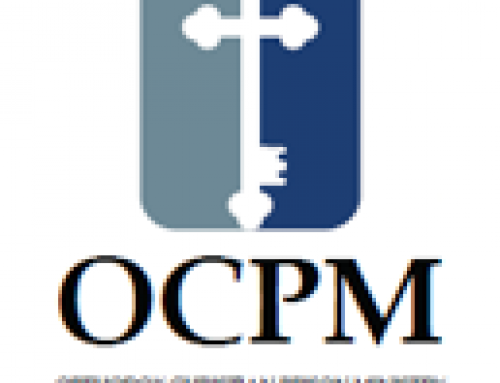This post was originally published on this site
The Life of St. John Chrysostom
Saint John was born at Antioch in the year 347. His father, Secundus, being a famous military commander, died soon after John’s birth. His mother, Anthusa, although being widowed at the age of 20, did not dare to remarry but rather devoted all of her time and efforts into raising her son with Christian love and piety. John was trained with the finest philosophers and rhetoricians, thus turning himself to the study of Holy Scripture and dedicating his life to Christ.
The church that he was quickly gaining popularity in was populated by bishops who enjoyed a life inconceivably lavish and extravagant, with pressure to host powerful figures. The sacred role of bishop consisted of pleasing royalty, and other transient concerns. It was his disapproval and powerful grace-filled words that eventually landed him in one of these very roles. After three years after his baptism, he was tonsured a Reader, and studied under many of her experienced instructors of ascetic life, specifically Flavian and Diodorus of Tarsus. It was there he learned true rhetoric through the study of Holy Scripture and prayerful contemplation. After some time, both John and his friend Basil were considered candidates for the priesthood, and after hearing this, they decided to withdraw to the wilderness as monastics to avoid this calling. John embraced monasticism, calling it the “true philosophy”, and after four years of struggling in the wilderness, he was obliged to return to Antioch to recover his health. Let us note that while being away from the world, he wrote many works, including his “Six Discourses on the Priesthood” and “Against the Opponents of Those Attracted to Monastic Life.” After becoming a deacon and priest in his hometown of Antioch, he was, somewhat against his will, ordained the Bishop of Constantinople.
John was different from the clerics of his day. With bravery and utter disregard for what would personally befall him, in place of hosting royal events, he implored his people to give alms. The Saints zeal in spreading the faith extended not only to those who lived in Constantinople, but also to those who lived in the Slavs, Asia Minor, and Syria. His “golden-mouth” touched the hearts of many, as he preached homilies that opened the ears to the word of God. Instead of placating the emperor and empress of his day, Arcadius and Eudoxia, he served as the needed voice of God in a time where His inconvenient truths were being suffocated by political and worldly concerns. As time progressed and aggression toward John became more and more evident by those in power, a sentiment only overpowered by the love of the people, he was banished by Arcadius and Eudoxia in a synod consisting of false charges. In response to the overwhelming demand of the people for their bishop back, John was restored.
This was not for long. John cut though the fear and pressure that might have scared another in his position into meekness when the Empress had a silver statue of herself built across from the temple of Hagia Sophia. He denounced and publicly preached against the idolatrous dedications ceremonies. The power of his voice, the love of his people, and the truth of his ministry this time were not enough to stop the Emperor and Empress. He was banished for the rest of his life. At first to a region closer in Georgia, but, in response to his place in the hearts of those still in contact with him through letters, later to a farther more remote region, which he never reached. He died on the way due to his deteriorating health and the harsh travel conditions.
There, on the brink of the world, having been banished from all he knew, he departed this life with the words, “Glory to God for all things.” It was Arcadius and Eudoxia’s son, Theodosius, who repented of his parents’ sin and restored his relics to the church. As he entered the temple of the twelve apostles, those present heard the words from his relics: “Peace be to you all” in 438 AD.
Feast Day: November 13
Adapted from St. John Chrysostom Archbishop of Constantinople
How can St. John Chrysostom intercede for us?
In the life and intercessions of Saint John Chrysostom we begin to discover answers to these questions. Perhaps Saint John himself would not have had the boldness and strength of God to answer them himself had he not lived out his yearning for God with his whole self earlier in his life. Before he became who we know as the “golden-mouthed” (the meaning of Chrysostom), before he had the resolute voice to restore the brokenness of the church in his day and call out the kings and queens that had authority to take his own life, the young John sought a life of quiet solitude. It was his strict asceticism and resulting poor health alone that forced him back into the world. Using the skills taught to him by his pagan rhetorician before his time as a monastic, along with the grace he experienced in his time away from the world, John spoke with powerful eloquence about the love of Christ at a time when it was needed most.
Pray to him when you are at a loss for words, when you are about to speak publicly, when you are afraid to say what is right, for the healing of the Church and for the moral voice of the political rulers.
Learn His Troparion:
Tone 8
Grace shining forth from your lips like a beacon has enlightened the universe.
It has shown to the world the riches of poverty;
it has revealed to us the heights of humility.
Teaching us by your words, O Father John Chrysostom,
intercede before the Word, Christ our God, to save our souls!
Discussion Questions:
- Many of us speak of and admire the bravery to speak out against wrong at all costs. But what does this really mean? How can we use examples from Saint John’s life and ministry and apply it into our own life?
- Saint John writes: “The mark of a soul that loves wisdom alway gives thanks to God. If you have suffered evil give thanks and it is changed to good… Give thanks even in disease, lack of possessions, or false accusations. It is not we who are injured but those who are the authors of them.” Reflect on this quote, keeping in mind that the last words of Saint John were “Glory to God for all things!” How are we to acquire true gratitude in our own lives?
Pray to him.
You have received many and various gifts from the Lord, and, as a good and faithful servant, have shown good increase of all the talents given to you: for this cause you were truly a teacher of the universe, for every age and calling learns from you. You are a model of obedience for children, a luminary of chastity for the young, a teacher of industry to grown men, an instructor of forgiveness to the aged, a rule of abstinence for monastics, a leader inspired by God for those at prayer, an enlightener of the mind for those who seek wisdom, an inexhaustible source of the living Word for well-spoken orators, a star of mercy for the charitable, a model of wise rule for those in authority, an inspiration to boldness for those zealous in the truth, a teacher of patience for those persecuted for truth’s sake: you have become all to all, so that in any way you might save some. But above all these, you have sought after love, which is the bond of perfection, and by that as by Divine power you have united all these gifts into one in yourself; and the same love, which reconciles the divided, you have preached unto all the faithful in expounding the words of the Apostles.
As for us sinners, each having our own gifts, we lack the unity of the Spirit in the bond of peace; we are vain, provoking one another, envying one another: therefore our divided gifts come not unto peace and salvation, but rather unto enmity and to our judgment. For this cause we fall down before you, O hierarch of God, in the grip of dissensions, and in contrition of heart we ask: By your prayers, drive away from our hearts all pride and envy that divide us, so that in many members there may be one churchly Body, and so that according to the word of your Prayer we may love one another and in one accord confess the Father, Son and Holy Spirit, the Trinity One in Essence and Undivided: now and ever, and unto ages of ages. Amen.
From an akathist to St. John Chrysostom




